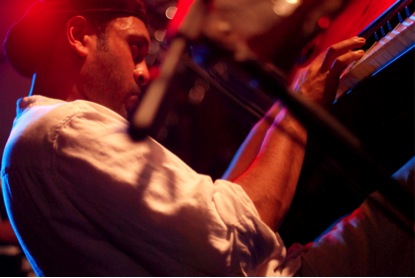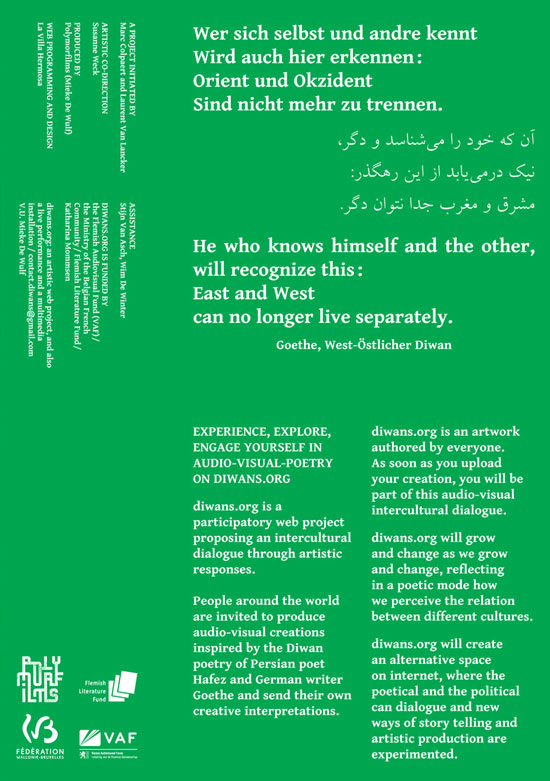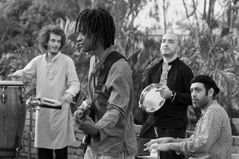2012 began with Lokkhi Terra performing at Drik. The group has performed all around the world at venues such as Ronnie Scotts, Royal Albert Hall, Royal Festival Hall, the House of Commons, Glastonbury and at Womad.? They were one of the critics? choices at this year?s Womad festival in the UK, and was the band chosen to perform at the closing ceremony of the South Asian Games 2010.
Lokkhi Terra?s two albums?No Visa Required,?and?Che Guevara?s Rickshaw Diaries, received much critical acclaim around the world.
From?Bangladesh,?Cuba,?Turkey,?United Kingdom
Open-eared and well-travelled world/jazz fusion
The music of Lokkhi Terra isn’t for those who don’t travel well, while those with strong wanderlust in their bones are advised to strap themselves in. The sound of this London-based, multi-membered collective zigzags all over the map. Their point of departure appears to be jazz fusion, but from here they touch down in the streets of Bangladesh, the Afrobeat clubs of Nigeria, the cantinas of Cuba and the beaches of Brazil. Such eclecticism might suggest a disjointed jumble, a sound dreamed up by committee. But in Lokkhi Terra’s care, it all makes utter and perfect sense, a seamless collage of some of the best noises this planet’s ever made. And they’re a bunch keen on album titles that sum up their modus operandi. Last year’s No Visa Required emphasised their border-busting sound, while their forthcoming record also gives a hint of their influences and inspirations: it’s called Che Guevara’s Rickshaw Diaries.
(Biography written by Nige Tassell 2011)
They have all performed around the world at venues such as Ronnie Scotts, Royal Albert Hall, Royal Festival Hall, the House of Commons, Glastonbury and at Womad.? They were one of the critics? choices at this year?s Womad festival in the UK, and was the band chosen to perform at the closing ceremony of the South Asian Games 2010.
Lokkhi Terra?s two albums?No Visa Required,?and?Che Guevara?s Rickshaw Diaries, received much critical acclaim around the world.
The combined sonic forces usually transform a quiet room into one which has people clapping and swaying within minutes and Khan is hoping for a similar reaction in India. Times of India.
Lokkhi Terra will be playing?23rd of January at Blue Frog Delhi and on the 24th January at Blue Frog Mumbai.
Lokkhi Terra is led by the Bangladeshi Kishon Khan

Here is what people have said about him:
?Kishon Khan leant back from his keyboards with the glee of a man driving a super-car, and played as if distilling the entire 1970s work of Herbie Hancock into a high-octane drive in the country, as congas bounced and brass slid around him…? FT.com
?A formidable jazz pianist? Simon Broughton, Evening Standard
? Highly innovative, a key figure in the British Bangla-Afro-Cuban-Jazz circle? Agogo Records
?Exceptional? ? Movimientos
Kishon Khan is a classically trained pianist, born in Bangladesh, and brought up and living in London. He is widely regarded as one of the most versatile players on the scene today ? sessioning across the genres whilst also being at the heart of some of London?s most critically acclaimed bands. He has lived, studied and worked in countries a far afield as Cuba, Brazil, South Africa, and of course Bangladesh, and this is reflected in the diversity of his musical works/collaborations.
Lokkhi Terra is developing the theme music for Chobi Mela VII, the international festival of photography, held in Dhaka.
———
The year sadly ended with the attack at Ramu, the devastating fire at Tazreen Fashions and the brutal assassination in broad daylight of Biswajit Das. While both parties wax lyrical on their successes at the talk shows, the real heroes of Bangladesh continue to be the farmer in the field, the migrant workers and the garment workers who pay for the lavish lifestyles of the Tri State residents of Gulshan, Baridhara and Banani. Let’s take time to remember some of the other Bangladeshis who have made us proud. Some of them young like the choreographer Akram Khan and the writer Tahmima Anam the cricketer Shakib Al Hasan, the educationist Salman Khan and others more senior like the elephant in the room whom we are not allowed to mention, Muhammad Yunus.
Please Retweet #bangladesh #muhammadyunus #tahminaanam #akramkhan #shakibalhasan #salm





